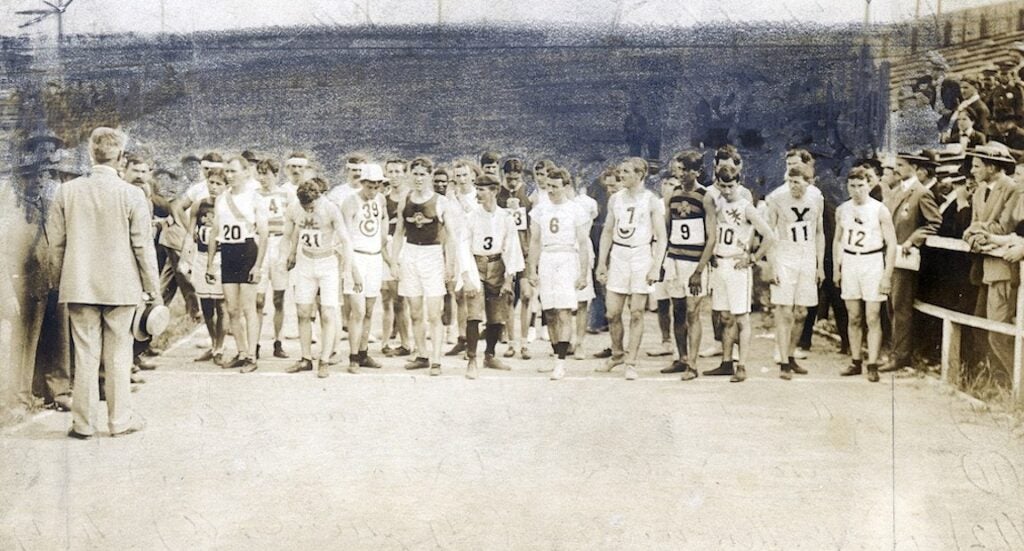Discovering Running’s Rich History
Running has evolved into a celebrated sport, exemplified by prestigious events like the Olympics. Today, marathons are revered for their discipline and endurance. However, the history of the Olympic marathon presents a stark contrast. The event’s early instance during the 1904 Summer Olympics in St. Louis was fraught with scandal, misconduct, and unexpected twists that shaped the course of modern athletics. Understanding this legacy offers valuable insights into how far the sport has come and the lessons it carries into the present.
A Chaotic Olympic Marathon
The 1904 Olympic marathon was meant to be a grand finale at a World’s Fair. Instead, it became a bizarre spectacle characterized by extreme conditions and a ragtag lineup of competitors. Only 14 out of 32 athletes managed to finish the marathon amid sweltering temperatures reaching up to 92°F. The range of participants included experienced marathoners and middle-distance runners alike. Spectators witnessed not just a race but a struggle against the elements and the unforeseen challenges each runner faced.
Controversial Conditions and Dehydration
Soon after the race began, it became apparent that this marathon was not organized with the athletes’ best interests in mind. The marathon track was dusty and winding, exacerbated by a lack of hydration. Surprisingly, the race organizers had restricted water access, allowing runners to drink only at two marked checkpoints. James Sullivan, the chief organizer, saw this as an opportunity to study the effects of deliberate dehydration on running performance—an unethical experiment that led to heat exhaustion and near-fatal injuries among the runners.
The Role of Performance Enhancers
In addition to hydration issues, the 1904 marathon saw the first recorded use of performance-enhancing drugs in the Olympics. Thomas Hicks, who ultimately “won” the race, ingested a mixture of egg whites, brandy, and strychnine sulfate—an ingredient common in rat poison. This toxic cocktail was believed to provide stimulation, but it led to hallucinations and severe physical distress. Unbeknownst to Hicks, these actions would later serve as a harbinger for stricter drug policies in modern athletics.
Notoriety Among Runners
Among the competitors, several stories emerged that would become part of marathon lore. Félix Carbajal de Soto, the Cuban athlete, lost his money while gambling before the games and arrived in less-than-ideal racing attire. He even detoured through an apple orchard during the race and suffered from food poisoning, yet he managed to finish fourth. His determination exemplified the unpredictable nature of this event. Another notable participant, Len Tau from South Africa, faced not only a grueling track but was also chased away from the course by feral dogs.
Legacy of the 1904 Olympic Marathon
The fallout from this chaotic event had long-lasting effects on marathon running and the Olympic spirit. Reflections on the 1904 marathon reveal that the attitudes toward athlete welfare, hydration, and doping practices have significantly transformed. As awareness about health and safety in sports has grown, so too have the considerations for how events are organized. This unfortunate chapter in Olympic history has allowed modern marathons to evolve into well-regulated and meticulously planned events, ensuring the safety of all participants.
Conclusion: Learning from the Past
As we partake in modern-day marathons, it’s essential to remember the tumultuous history that paved the way for today’s events. The lessons learned from the 1904 Olympic marathon remind us of the importance of athlete care, ethical considerations in sports medicine, and the implementation of stringent regulations against performance-enhancing substances. To truly appreciate the legacy of running, it’s crucial to understand its past. Each step taken today in marathons is built on the lessons learned from those who ran in desperation and determination over a century ago.
Subscribe to our Local Running Newsletter for the latest updates on running events, training tips, and routes near you!
